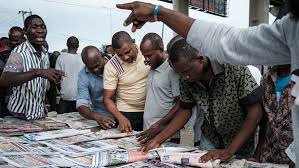APA – Lagos (Nigeria)
The report that the Nigeria Labour Congress, on Thursday, warned the Nigerian Government against heeding the advice of the World Bank to increase the pump price of petrol to N750/litre is one of the trending stories in Nigerian newspapers on Friday.
The Punch reports that the Nigeria Labour Congress, on Thursday, warned the Federal Government against heeding the advice of the World Bank to increase the pump price of Premium Motor Spirit popularly called petrol to N750/litre.
The NLC’s Head of Information, Benson Upah, in an interview with The PUNCH, said any further increase in the price of petrol would lead to anarchy in the country.
He, therefore called on the government to reject the proposal of the World Bank that petrol should sell at about N750/litre, as against the current rate of between N620 and N650/litre in most locations across the country.
This came as oil marketers explained that the cost of PMS should be around N1,000/litre had it been that the government not subsidising the product.
But the government, on Thursday, denied the claims of marketers and the World Bank as regards the reintroduction of subsidy on petrol in Nigeria.
The World Bank, on Wednesday, asked the Federal Government to stop the subsidy payment on petrol and raise the cost of the product to N750/litre.
It said the Federal Government might still be paying the subsidy as fuel prices in Nigeria were currently not cost-reflective, stressing that Nigerians should pay about N750/litre for PMS as against the current price of N650/litre.
The newspaper says that the Nigerian Government, on Thursday, announced that the liquidity in Nigeria’s power increased from N282bn in 2015 to N900bn currently, adding that its financial burden in the industry had been reduced by about N373bn.
It disclosed this through the Nigerian Electricity Regulatory Commission at the Ministerial Retreat on the Integrated National Electricity Policy and Strategic Implementation Policy.
Liquidity refers to the efficiency or ease with which an asset or security can be converted into ready cash without affecting its market price. The most liquid asset of all is cash itself.
In a presentation at the event, the Chairman, NERC, Sanusi Garba, said, “Liquidity in the market has moved from N282bn in 2015 to N900bn now. We have also created a mechanism for enforcing payment discipline in the industry. This has seen Disco revenue improve greatly.
“We have reduced the fiscal burden on the government from N528bn to N155bn in 2022. Without our actions, the subsidy would have been in the region of N665bn.”
Speaking on the sidelines of the closing ceremony of the summit, the Minister of Power, Adebayo Adelabu, appealed to operators and agencies in the sector to work with the government, stressing that those who fail to deliver would be shown the way out.
The Guardian reports that the Nigeria Police Force has said Nigerians are free to video and photograph police officers on duty. The Force Public Relations Officer (FPRO), Muyiwa Adejobi said this in a statement via his X handle on Thursday.
Adejobi was responding to an X user who said some police officers extorted N10,000 from him for videoing them during a stop-and-search operation.
The Force PRO emphasised that it is not an offence to video or take photos of police officers on duty. The X user, @Boy_Cyril wrote on his handle, “Sir, is it a crime to video during stop and search because I had to pay N10,000 for those officers to give me back my phone after taking it forcefully from me just now.”
Adejobi said that the police had announced several times that there is nothing wrong with Nigerians taking photos or videoing police officers on duty.
He added that anyone who is harassed by any police officer for videoing or taking photos should report the case to the police authority.
He said, “You can video or take pictures of policemen on duty. We have said it severally. There is nothing wrong with that.
“You can take up the case. Send an SMS to me or to our email box, Pressforabuja@ police.gov.ng. you can as well talk to your PPRO.”
The newspaper reports that
The newspaper says that in a groundbreaking move, the Lagos Free Zone (LFZ), the first privately-owned zone in Nigeria, is poised to attract increased foreign direct investments from the United States.
The surge is attributed to the zone’s exceptional infrastructure and a plethora of incentives, including its integration with the Lekki Deep Sea Port. The United States Consul General, William Stevens, leading a delegation from the United States Consulate General, expressed optimism following a comprehensive tour of companies and facilities in the zone. Stevens lauded the impressive and outstanding business relationship between Tolaram and US companies.
According to him, through the opportunities at the LFZ, investors from the United States have deepened penetration in the Nigerian market by introducing world-class goods and services to the country.
He noted that the influx of investments from U.S. companies would not only fortify the economic ties between Nigeria and the superpower but also underscore the unique incentives offered by the LFZ for U.S. companies looking to establish a robust presence in the Nigerian market.
“It is amazing to see the partnership between Tolaram and U.S. companies and the opportunities therein. We are constantly looking at how we can attract more American companies to this market both in terms of investment and trade,” he said.
GIK/APA
Nigeria: Press spotlights rejection of World Bank’s N750/litre proposal for petrol, others

Next Article EU Commission President to visit Rwanda

